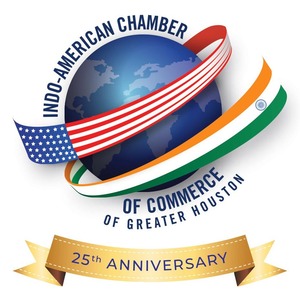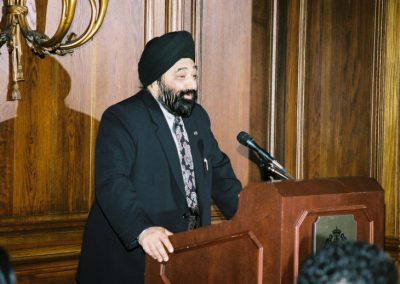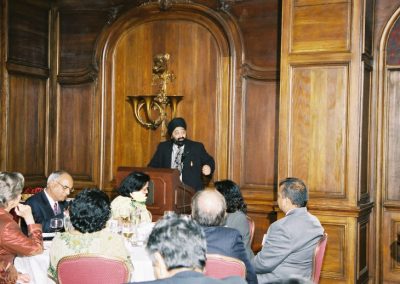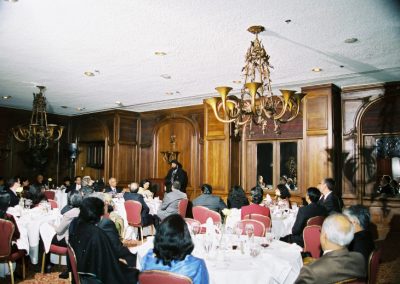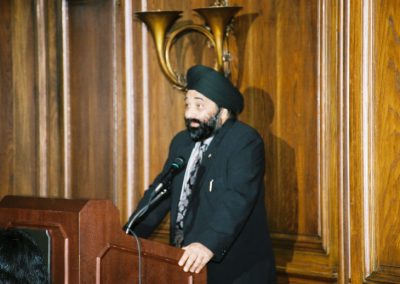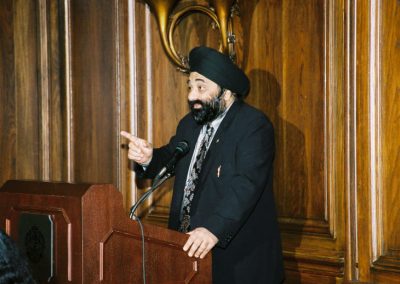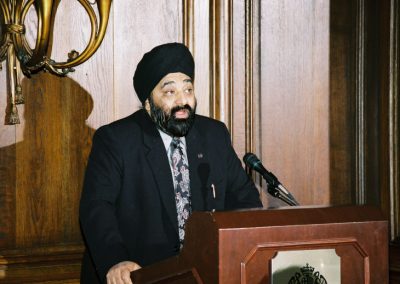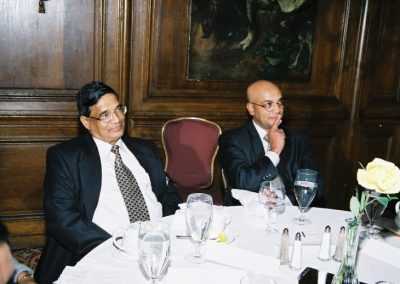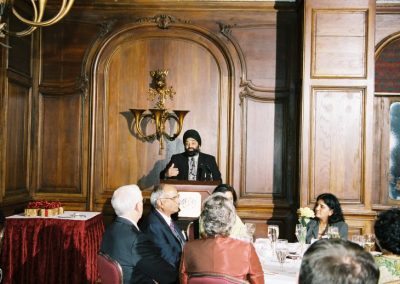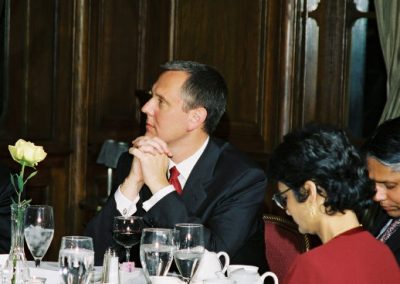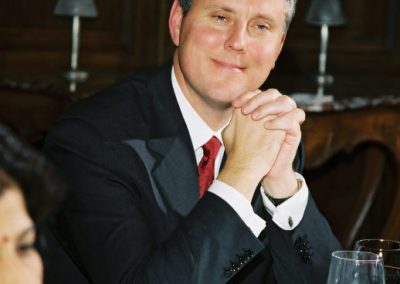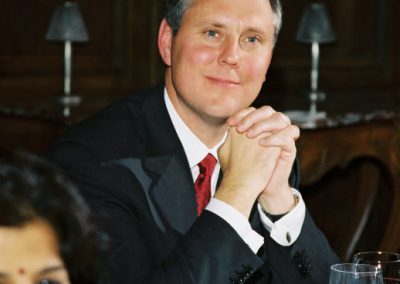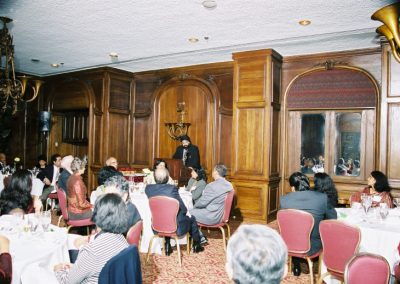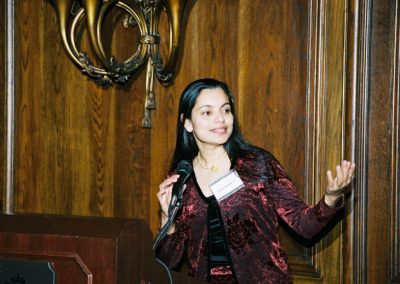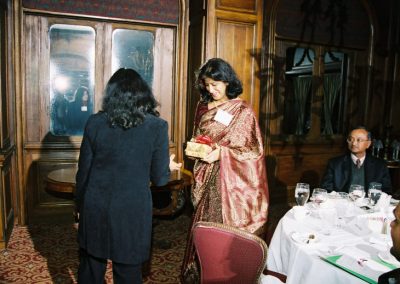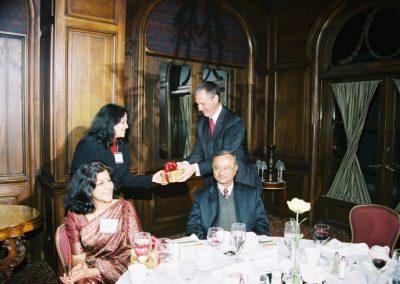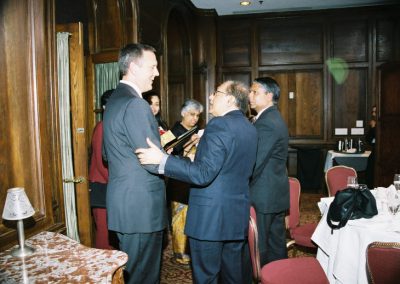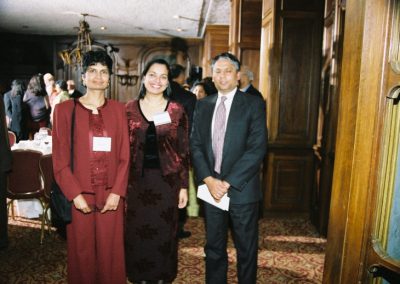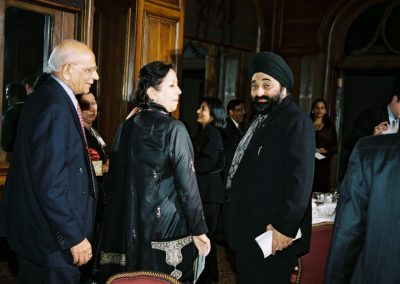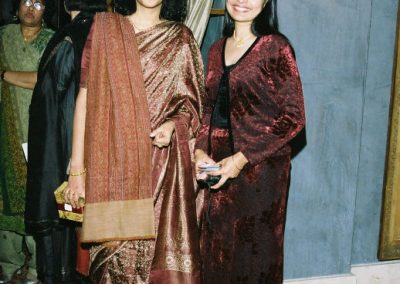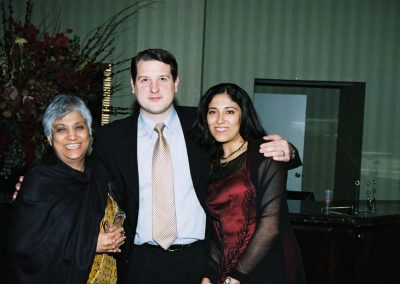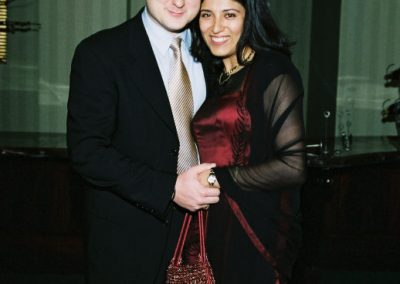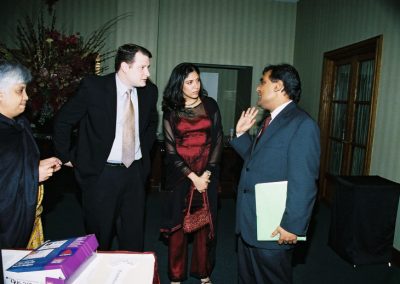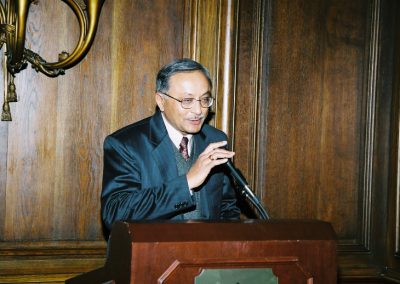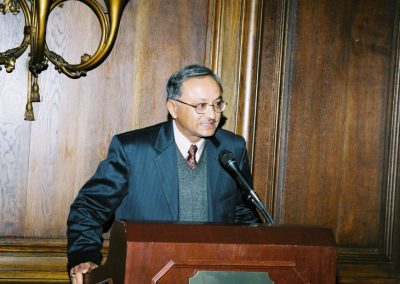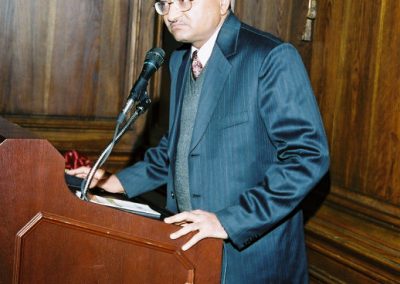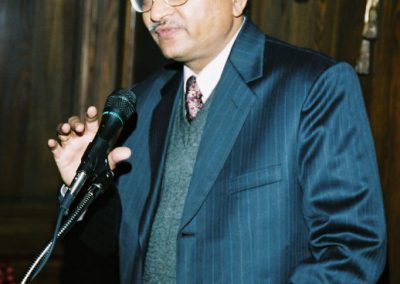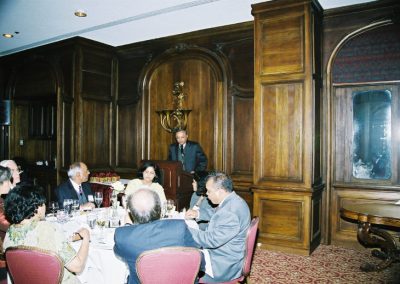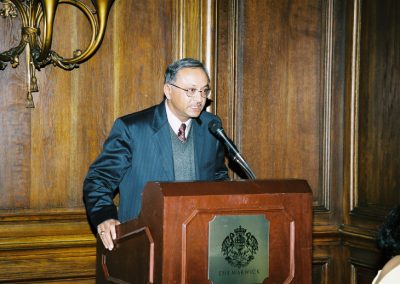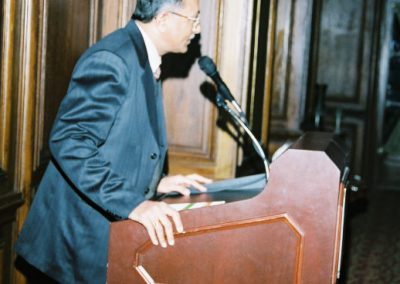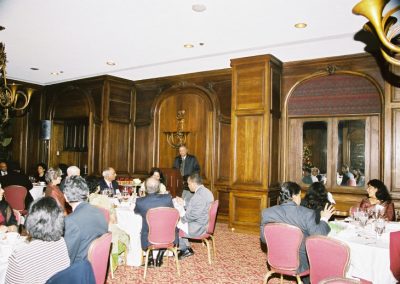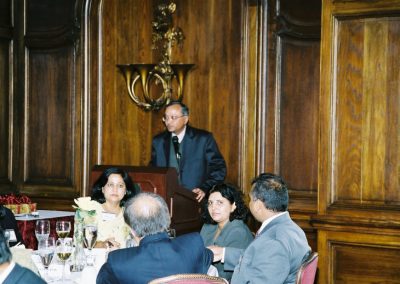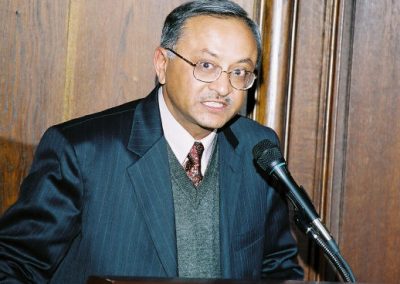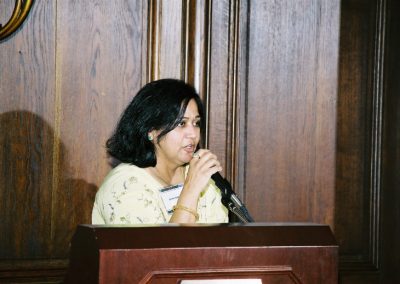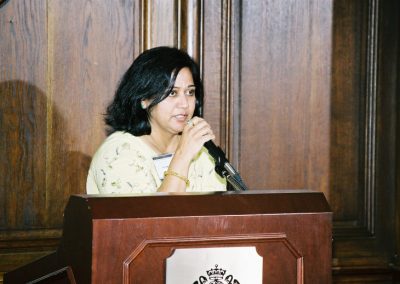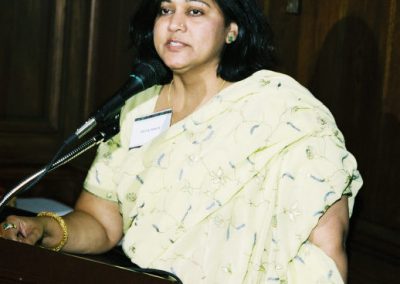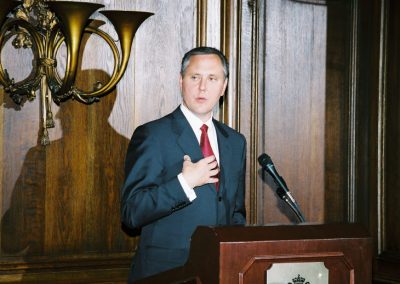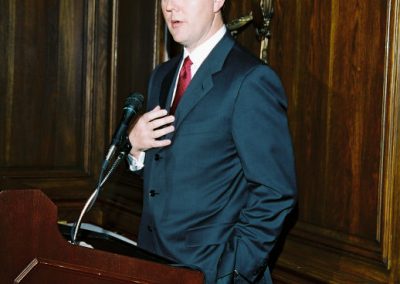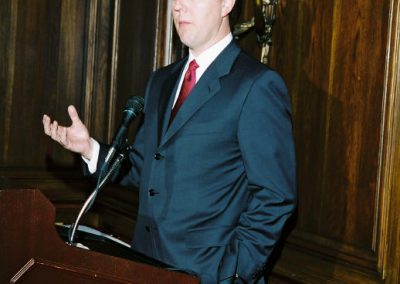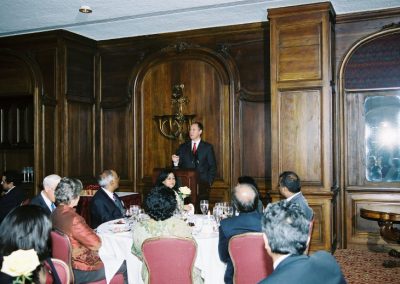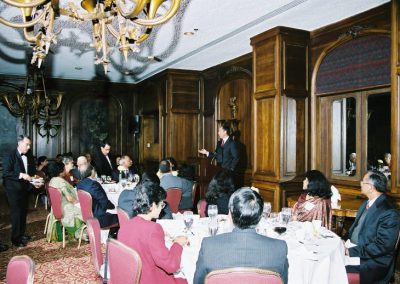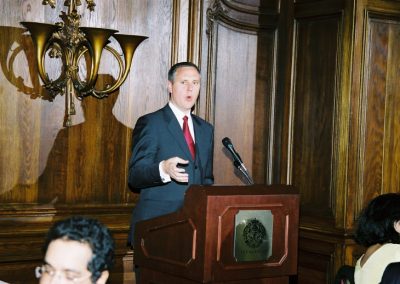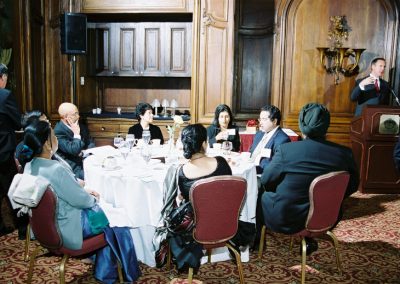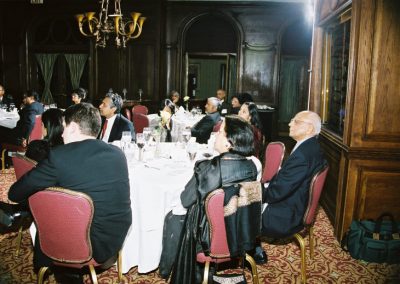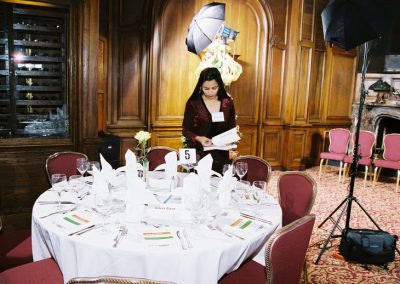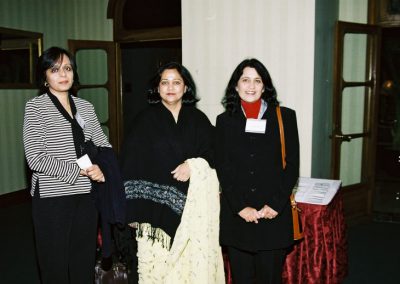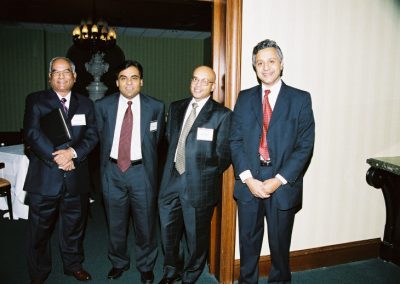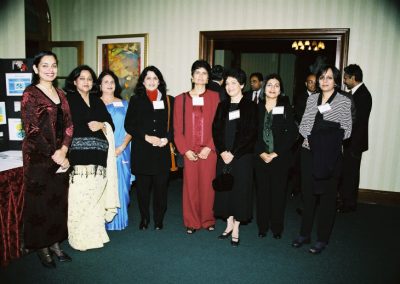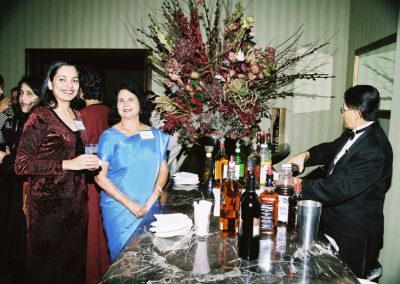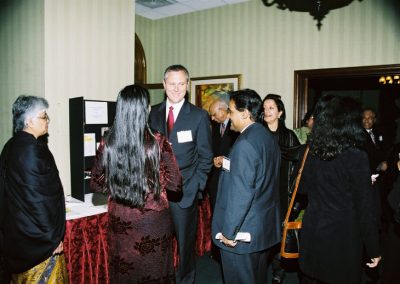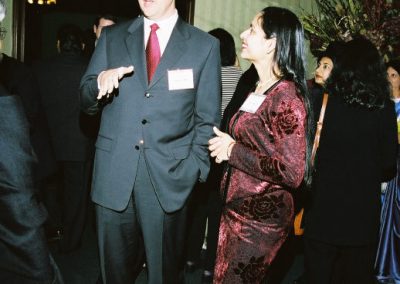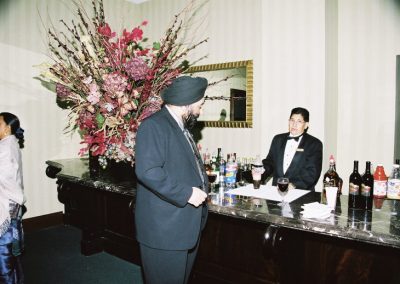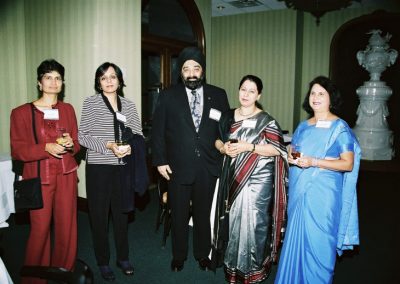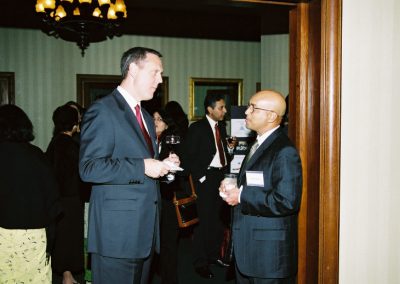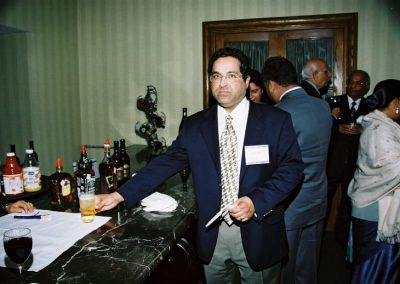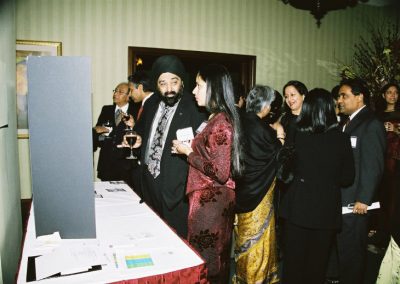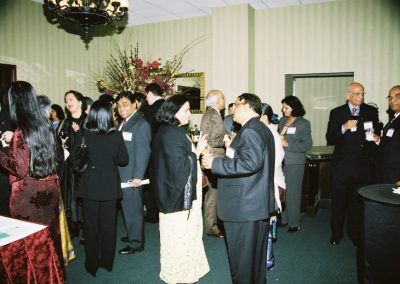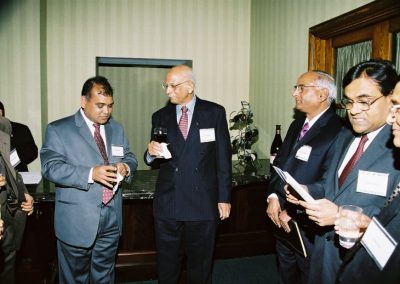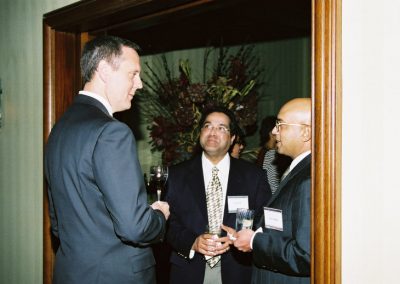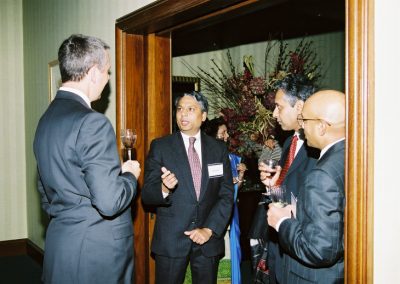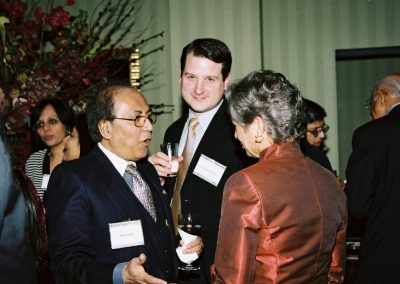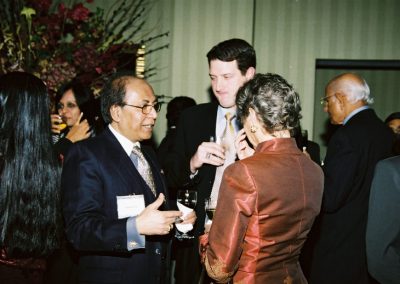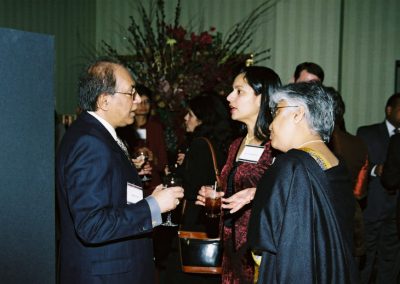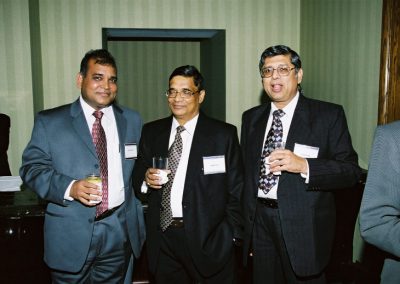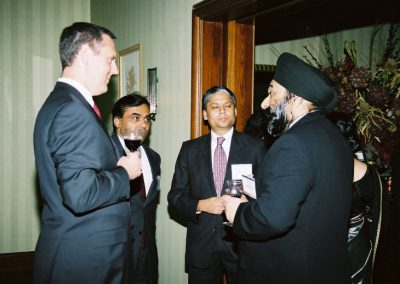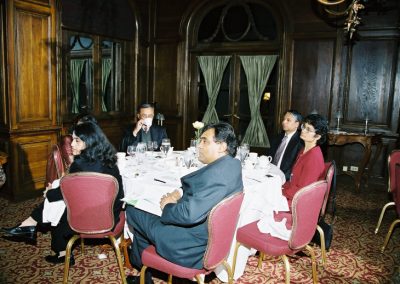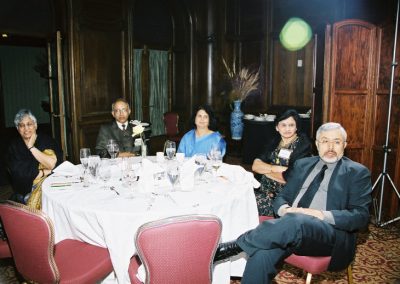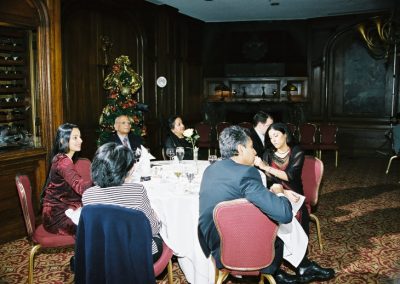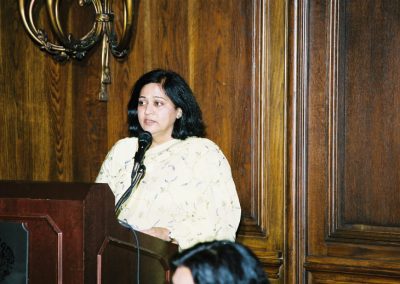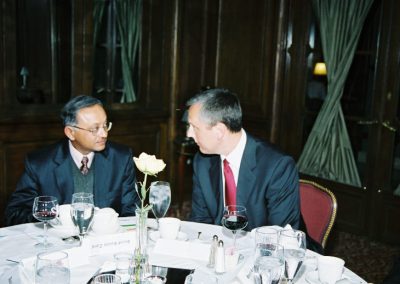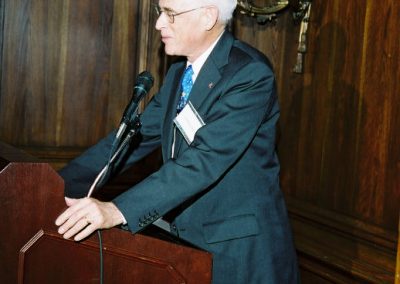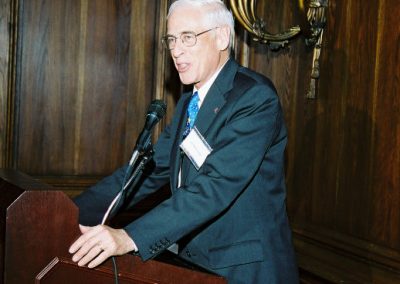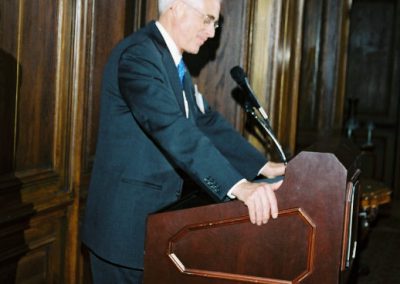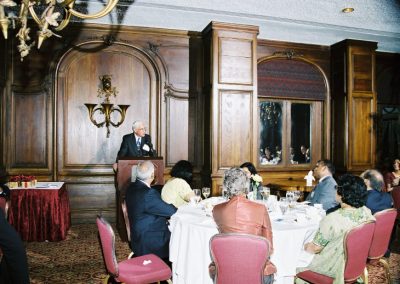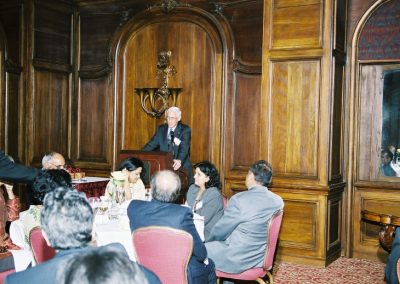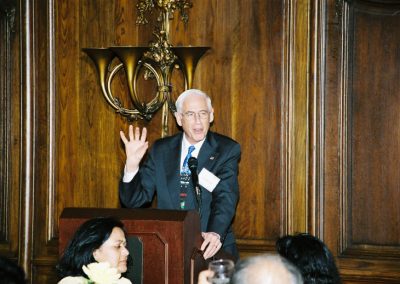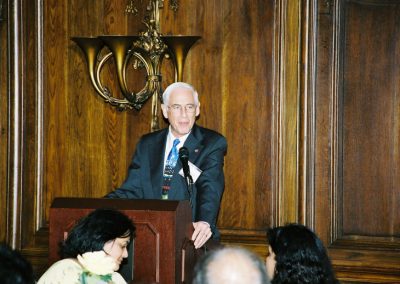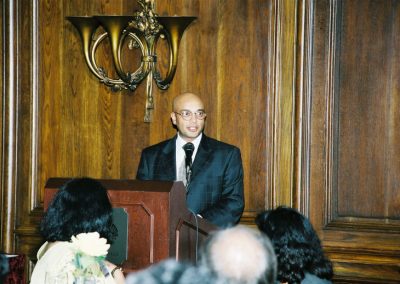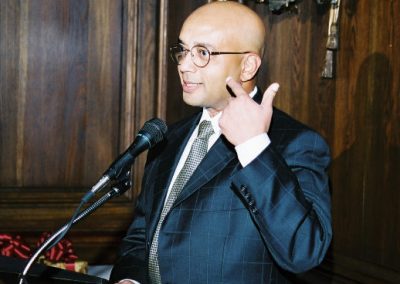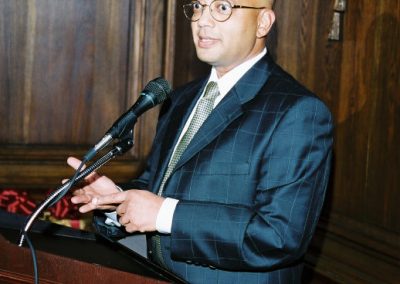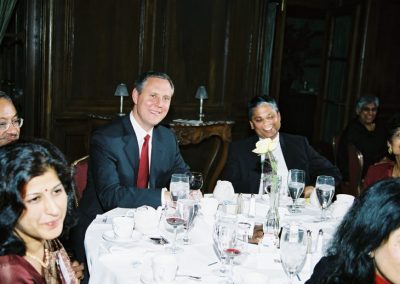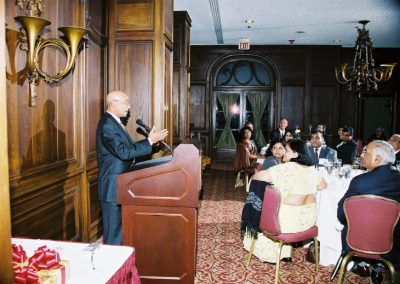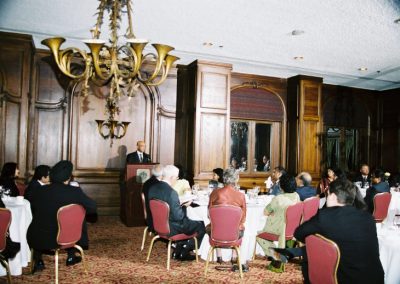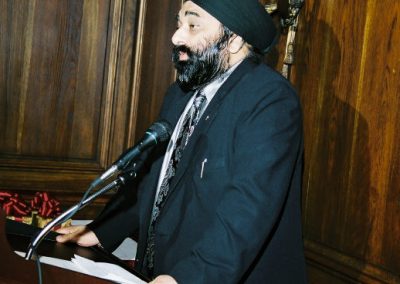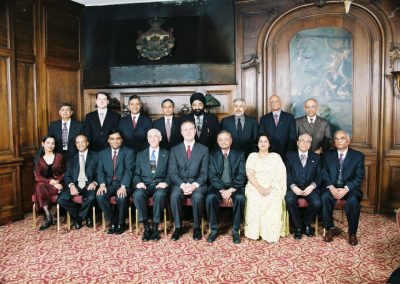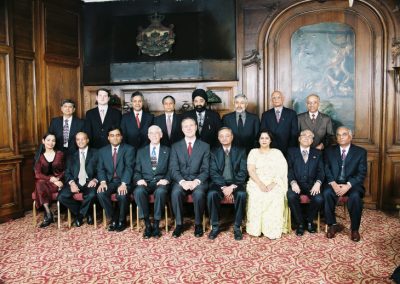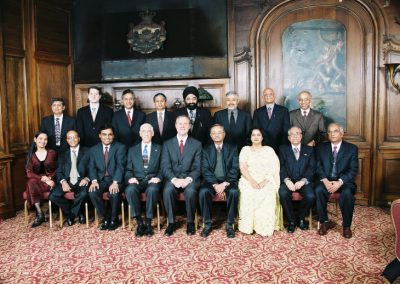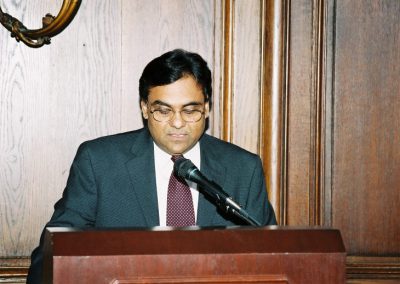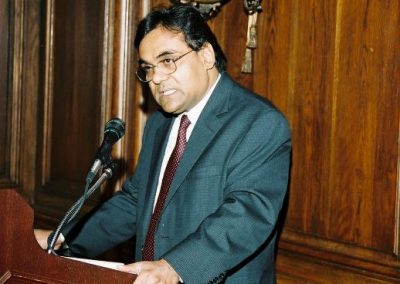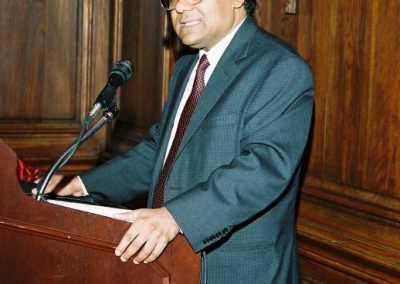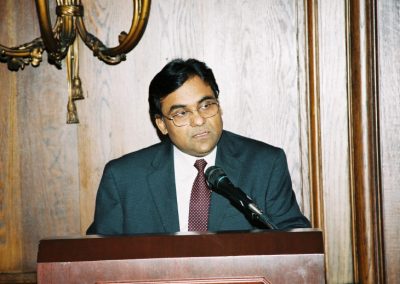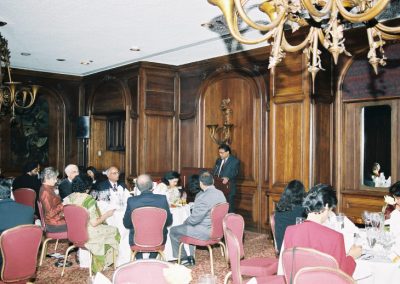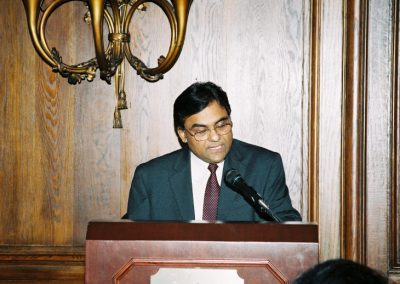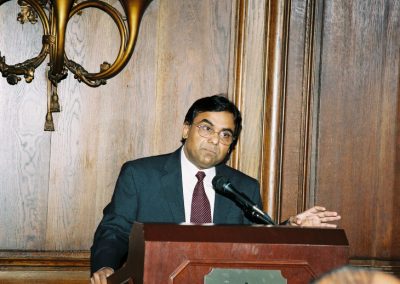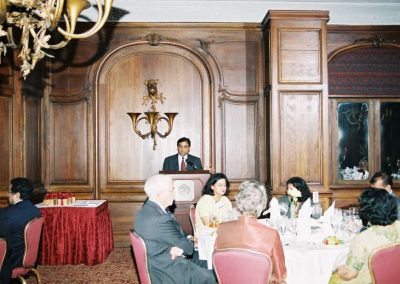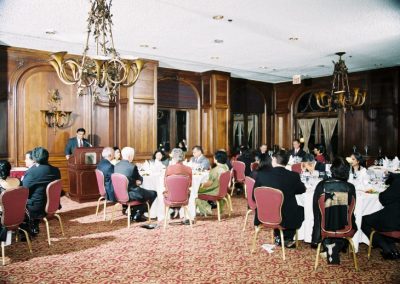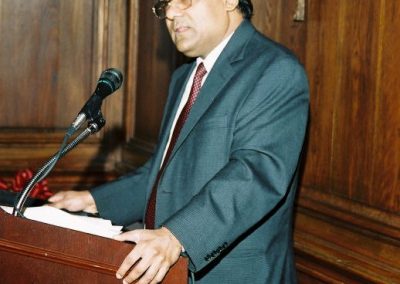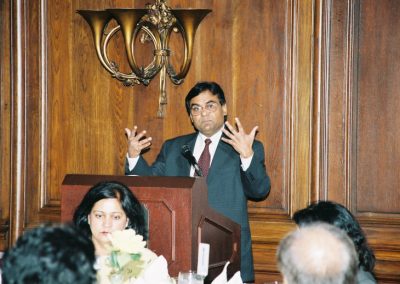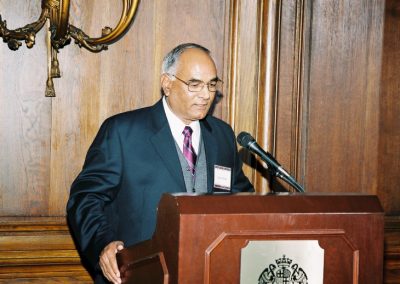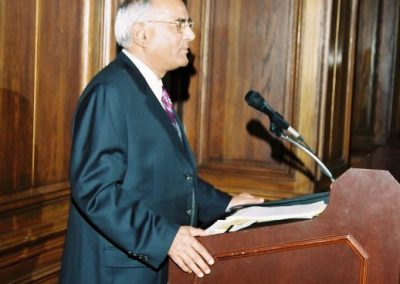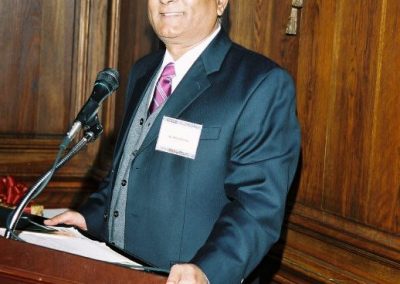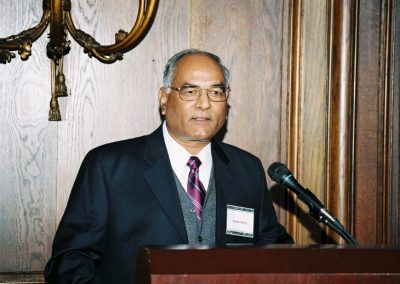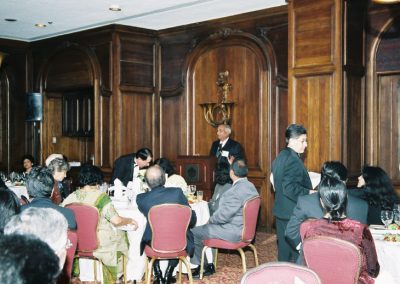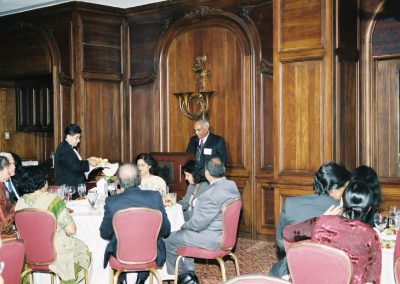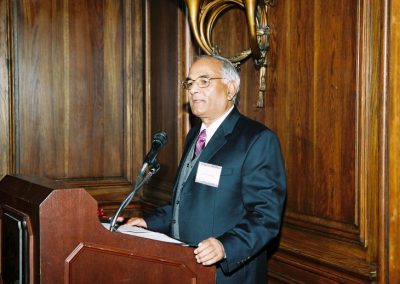IACCGH hosted its Annual Advisors’ Dinner on December 5th, 2002 at the Warwick Hotel. At this meeting the Chamber gives its Annual Report to the Advisors by briefing the Advisors on the accomplishments of the Chamber in the past year and seeking their input and guidance for the coming year. The attendees this year included, Consul General of India Mr. S. R. Tayal. And his wife Kusum, Dr. John Medelsohn and his wife Anne, Mr. Vijay Goradia and his wife Marie and Mr. Bob Beauchamp , CEO of BMC. Executive Director, Chitra Shanbhogue welcomed the guests and outlined the agenda for the evening.
The evening agenda included the President’s report, Dr. Sen Pathak’s report on the M.D.Anderson trip to India, Advisors feedback and a vote of thanks by President-elect Jagdip Ahluwalia. Excerpts of the speeches follow:
Mr. Ashok Shah, President 2002-03:
“Good evening everyone! I thank the advisors, BOD members and guests for coming to this dinner meeting. Before I begin I would like to update you that we have two new advisors Dr. Arthur Smith, President of University of Houston and Ambassador Roy Huffington. Unfortunately they were unable to join us this evening due to a prior commitment and send their regrets. Moving on to the Agenda of the evening, we have created a booklet, which you should have before you, to help follow along as I go through my presentation.
The IACCGH motto is Transforming Promise to Prosperity. There are 120,000 Indo-Americans in the Greater Houston area and we are a community of professionals. The Chamber is committed to helping our members realize their aspirations and goals.
Prosperity comes from understanding member’s needs and creating programs to cater to those needs. This year we have created a framework for the chamber keeping member’s needs in mind. Framework is an organized way of thinking and results in long term success. Periodically we will continue to inspect this framework, its programs and we will continue to improve our programs and approach. Using the Mission as our guideline, the Chamber has created programs which address our mission. If we look at the Member Lifecycle page, we see that there is an hierarchy in member needs. I call this Maslow’s hierarchy of needs. The needs can be broadly divided into three stages, Stage one being, what is in it for me? Second stage is What is in it for US as a business? And finally what can I do for the community?
Our framework addresses and provides platform for each of these stages and can be broadly categorized as:
1) “My Business” – Opportunities to improve general business know-how and capabilities – To reduce Cost or improve opportunities.
a) IACCGH has introduced the concepts of clinics this year which help small businesses and provide members volunteer opportunities. As of now the IT clinic is in the Pilot Phase and has performed two IT assessments. Free to our members- In fact this service alone can more than repay the annual fees of our professional/small business members.
b) Knowledge Expansion through monthly speaker driven events. Our monthly events focus on today’s issues for the businessperson.
c) Another new avenue of knowledge sharing which IACCGH has entered into is the airwaves. The Chamber sponsors a Radio Program called ‘Open Forum’ bimonthly, which airs on Saturdays at 5:00 p.m. on KTEK 1110 AM. The focus has been on Corporate/entrepreneur Success stories and best practices. Dec. 7th this Saturday, we will have two of our Directors Subroto Mukerji and Somesh Singh participating in the panel discussion. A great value to the community.
d) We were very pleased to offer free membership for one year to the National Federation of Independent Businesses (NFIB). The NFIB membership offers deep discounts for travel, insurance, healthcare etc for independent businesses. This free membership is worth $200-$800 depending on the size of the business.
e) In October we had a very successful Networking Golf Tournament, teaming up with Junior Achievement. With around 100 participants, the event offered great networking opportunity. Part of the proceeds was donated to JA at their November Board Meeting. As you will see for professionals/small businesses /corporate members, we have created a great value proposition.
2) Our Business – Opportunities to create a healthy Business ecosystem- What is in it for US?
These programs are geared towards improving businesses in general. The IACCGH has achieved this by striking up alliances globally, nationally and locally to form a web of resources for our members. These alliances allow the sharing of Best Practices and providing resources when our members are doing business outside of Houston. Globally we have signed a memorandum of understanding, a MOU, with Indo-American Chambers of Commerce in Mumbai. They will be our resource for any member company who wants to go into India to do business. Nationally we have alliances with Indo-American chambers of Commerce in Dallas, Tampa & Georgia. We have also signed a MOU with United States India Business Council (USIBC) in Washington. Locally we have strategic alliances with other minority chambers and the Houston Technology Center.
On policy front, IACCGH was able to successfully lobby for the H 1 B employees who have had to pay social security even though they cannot avail of its benefits. In August we presented our concerns and recommendations to the President’s commission and we have just heard that an administration protocol is close to being signed which would be the first step towards an agreement being ratified between the two countries. US has similar such agreements with 20 other countries including Germany, UK and Japan.
3) India Advantage- Opportunity to contribute to the community: We call it the India Advantage and the programs we have undertaken this past year have been:
a) M.D. Anderson delegation to India to explore the possibility of having a sister organization and research knowledge sharing collaboration in India. Dr. Sen Pathak who is here with us today will give a brief presentation, first hand accounting of this trip.
b)Education- Math Think Tank –IACCGH is facilitating St. Stephens College in Delhi and University of Houston together to offer a 2 yr Master’s program in Financial Engineering. A very unique course. We are eagerly awaiting the start of this program in the next few months.
c) Trade Delegations-This past year alone we have had three delegations from India come to Houston. The delegations were from the Oil & Gas Exploration sector, Power Sector and the Rubber industry.
Personally, It was great to visit BMC Pune- It has grown from a handful of employees to over 100 in one year and is still growing.
In the world of globalization,IACCGH believes that combination of America and India in all the fields Of Knowledge-IT, Health, Educations, Space, Research etc. etc. an India partnership is a must to be a leader. And IACCGH’s India Advantage initiative can bring lots of meaningful projects for our large corporate members.
In a nutshell we have achieved a lot this year and we believe we have the required framework in place. These results were achieved by keeping 3 major principles in mind.
. Distributed leadership model which allowed each BOD to Captain and drive different programs throughout the year. This has resulted in more leadership for Houston, This has resulted in getting more done and this has resulted in leveraging respective talents of BOD members. 2-3 projects per BOD member can result in 25-30 major programs and this is great for the membership.
Reaching out- we have reached out and formed alliances with other like minded organizations, forming a web of services for all our members. This is resulting in learning Best Practices, This is resulting in sharing of infrastructure and this is resulting in not offering redundant programs. A great example is partnering with Junior Achievement for our Golf Tournament. With this philosophy we are more inclusive and reaching a wider spectrum of audience.
Technology-We have updated our office infrastructure to have two computers connected via a network with latest Software allowing staff to work independently and simultaneously. We will continue to stay at the forefront of technology to ensure huge productivity for our lean staff and lean infrastructure.
Like every year I would like to request our Advisors to give us suggestions and guidance in improving what we have already accomplished. From the SWOT analysis which we have included in the booklet, you have an idea as to what areas we would like to hear from you. One major opportunity we have is how do we increase our membership? The potential target population is huge and our goal is to increase our membership from 110 to 1000.
For the upcoming year the, IACCGH focus is on Membership, more Alliances, M.D. Anderson initiative, and leadership training offering tangible value to our membership.
As you see your chamber is making determined progress, offering value to its members. Our members include professionals, small business, and large corporations. We are offering value respective to our member’s needs. This is a conscious effort of this board and I am privileged to be a part of this team.
Finally, I would like to introduce the Chamber’s newest Advisor, Consul General S.R. Tayal and the new Deputy Consul Mr. R. L. Koli as well as the newest Board members, Brij Kathuria and Jonathan Faulkner. I thank Mr. Tayal and Mr. Koli for their help and support for all the Chamber activities. I would also like to welcome & introduce Dr. and Mrs. Guru Reddy and Mr. Brij Agrawal. Mr. Agrawal has given a substantial donation towards the M.D. Anderson project.
I now invite, Dr. Sen Pathak to give us his update on M D Anderson initiative”.
Dr. Sen Pathak
Dr. Sen Pathak, who recently retired from M.D. Anderson and was part of the M.D. Anderson Delegation to India spoke next. Dr. Sen Pathak completed his B.Sc., M.Sc. and Ph.D. at Benaras Hindu University and came to Houston on a Fellowship at Baylor College of Medicine, in the Dept. of Pathology in January of 1970. He chose to join M.D. Anderson Cancer Center where he worked for over 31 years. He feels privileged to have worked under three Presidents of the Center, including the current President, Dr. John Mendelsohn.
He talked about their trip to India, where their first official visit was to SVYASA in Bangalore. Dr. Nagendra is the Vice Chancellor of SVYASA, which is a recognized University offering Masters and Ph.D. Degrees. There is an emphasis on spirituality at this center. They have done extensive Research particularly on Breast Cancer and Yoga. During Chemotherapy, the patient is asked to do Yoga, which reduces the side effects of the chemotherapy. During their stay, Tom. Brown, Dr. Durga Agrawal and Dr. Pathak were given a private lesson in Yoga by a physician at the Institute which was very exhilarating for them.
He mentioned that Dr. Nagendra would be visiting M.D. Anderson on December 16th and 17th and would be giving a talk which was open to anybody who was interested.
After Bangalore, Dr. Pathak and Tom Brown went to Bombay to visit the Tata Memorial Cancer Center, which is the ‘M.D. Anderson’ of India. They were joined by Ashok Shah, the President of IACCGH. At TMC, they met the Director, Dr. Katy Dinshaw, who showed them around and told them about the work they do there. She mentioned that the incidence of breast cancer among Indian women is rising. That is the same information they received at the other centers as well. Dr. Shyam Agarwal of the TMC Research center made a presentation about their work there. After the presentation, there was a discussion on what kind of help they required and what M.D. Anderson could do to help. They explained to Dr. Dinshaw that M.D. Anderson’s mission is to try and eradicate cancer all over the world.
From Mumbai, they traveled to Delhi, where they met the Health Minister Mr. Shatrughan Sinha, who promised to ban the use of Pan Parag- the main cause of Cancer of the Mouth. The Delegation then went on to meet the President of India, Sri Abdul Kalam. It is the President’s hope that cancer treatment can be available to everybody, everywhere.
They also visited the All India Institute of Medical Sciences in Delhi, where they met the Director Dr. Dave and Dr. Vinod Kochupillai and heard about the Research being done there. They also discussed the possibility of having a conference on Breast Cancer at the end of 2003.
After Delhi, Dr. Pathak proceeded to Sevagram, near Nagpur,which is where Mahatma Gandhi opened the first leprosy hospital which is now a full fledged Medical center. There he found that the incidence of cervical cancer and ovarian cancer is quite high. The one thing he found is that women who have breast cancer do not have ovarian cancer and vice versa. In the U.S., there are two types of patients- those with only breast cancer and those with both breast and ovarian cancer. This is an important difference and our physicians can learn from them, the biological differences and the reason for the Indian women to not have both kinds of cancer together.
Dr. Pathak concluded by saying that cancer in India is increasing at a great rate and they need help to deal with it. He also hoped that Dr. Mendelsohn would be able to visit India some time to see what can be done to help them. He mentioned that he visits India every year and manages to give several lectures about the kind of Research which is being conducted here. He felt that M.D. Anderson can receive help from India as well. Physicians can learn about some types of cancer which are quite common in India but fairly rare in the U.S.
He thanked the Chamber for giving him the opportunity to be a part of this Delegation.
After Dinner, Board Member Deepa Thakur invited the Advisors to speak to the guests.
C.G. Tayal
Mr. Skand Ranjan Tayal said that the Chamber is doing a great job. He has been told by Mr. Mansingh, the Indian Ambassador to the US, that this model needs to be replicated. He said the chamber needs to chalk out a course of action for 2003. It needs to have more concrete projects like what has been done for Cancer Research. He mentioned the ‘Disinvestment’ program in India, which offers many opportunities. Private investment is being invited in many sectors. The Hospitality, Mining and Refineries sectors all have some excellent investment opportunities. He said that there is a whole basket of Industries waiting to be modernized in India, where American technology and investment would be useful. In the field of Information Technology, India has been recognized as a world leader and has given the United States a competitive edge globally. Productivity in the U.S. has risen by 2-3% and if analyzed, the role of India would be visible. He said that the future appears to be Life Sciences. In that area, Texas has an advantage. Texas Medical Center is one of the best in the world medical facility.
The regulations in the U.S. are more stringent than in India. There is a pool of 30,000 Indian-American Doctors here who need to be leveraged. They, and the whole army of Doctors and Research Institutions and Hospitals in India can work together to create new frontiers which can be researched and then commercially exploited.
His suggestion for 2003 was for the Consulate and the Chamber to arrange a Half Day or One Day Seminar on India Advantage in IT. The Ambassador had mentioned that among the Fortune 500 Companies, about half of them are active in India. Two to Three Hundred companies from Houston and other cities could attend the seminar and be exposed to the facilities which are available in India. He offered the support of the consulate to put this project together.
Mr. Bob Beauchamp
Mr. Bob Beauchamp, President & CEO of BMC Software. He said that he first got involved with IACCGH out of a selfish interest- the intention of expanding BMC into India. Next was to see how the company could benefit from going into India. This has been a tremendous success story. The cost of putting a project together in India is approximately 10% of the cost of doing it in the U.S. The company has grown significantly in India and he hopes to expand the company further. This will all result in an improvement in quality of codes, customers well cared for and great financial benefit to BMC.
He then turned his attention to self-actualization. He is very proud of the fact that he is now the Chairman of the Diversity Council of Houston. He had spoken that morning to the President of the National Diversity Council of Houston. Steve Miller, the Ex-Chairman and CEO of Shell USA, Inc. Bob Beauchamp believes strongly, that Diversity is one of the great strengths of BMC. Two days ago when he was in Atlanta, he was one of the speakers at the Department of Defense Information Systems Administration annual event. The top technology leaders for all of the combined United States Military forces were there, together with the top Generals who report directly to the President of the United States. The Joint Chiefs of Staff, along with about two thousand other people who represent the top Military officers mapping the future of technology were also present.
Gen. Bryant of the Special Forces, who has risen to be a Three Star General in charge of the Communications Command Control of the United States Military was also a speaker. At the end of his presentation, he showed a video of September 11th. It was very moving and showed the Military men and women around the world responding. Then he stood up and said something. He said, let me tell you about the greatest weapon of all. The greatest weapon that we have in this country is diversity. It is a country- a melting pot that has the strength of combined cultures and I firmly believe that this is one of the greatest strengths of the United States, and the future of the world and we have to learn to live together or we will fail as a world culture.
He praised the chamber for the good work they were doing, but told them to watch out, because he had just returned from Shanghai, where he met the Mayor and Vice Mayor. The Vice Mayor is in charge of technology. She is very well educated and knowledgeable. Her question to Mr. Beauchamp was why they are taking their business to India and not to China. She said that they would make it worthwhile for BMC to do business in China instead of India. He said that it is necessary for us to be vigilant to make sure India does not lose out to competition. He suggested that we should think of ideas which will make it easy for Corporations to do business in India. He mentioned that nobody had brought him potential customers in India for BMC to do business with. China has been doing that. They have introduced potential customers. His advise to the Chamber was to look at the other side of the transaction- not just the cost reduction, but revenue enhancement as well. He ended by saying that India is a great economy and he expects to be there the following year.
Dr. John Mendelsohn
“Obviously we have kicked off and started something here. I talked with Tom Brown on the telephone for half an hour. He went from India to Spain but he called me and gave me a report. He said it was a wonderful start and I am looking forward to an equally stimulating chance to visit India. In medicine, it is a little different goal. We mentioned Information Technology and I would agree. I think that Bio-Technology is going to be as important for the economy, as well as for our health in twenty years from now, as Information Technology. I think that Houston and India are in very similar positions. Here we have Texas Medical Center- the best medical care in the world. But the people in Venture Capital fly to the East Coast and to the West Coast. My goal is to get a big magnet and call them here while they are flying and tell them ‘Here is Houston. There is a lot here. ‘ I think India is in the same position. There are a whole lot of smart, educated people in India, probably more than anywhere in the world, that have studied science, mathematics and are great thinkers. But the world tends to fly over them, doesn’t drop down there. So we have to develop strategies to bring opportunities to Houston and we have to develop strategies to bring opportunities to India. We have to think the same way about that.
Just briefly about cancer, it is very interesting to listen to Dr. Sen Pathak’s descriptions. When I give my lectures, I now say that cancer is caused by genes. We all know that, and there is mutation of genes and malfunction of genes and that is what causes cancer. That is the ‘Mantra’ we all live with in M.D. Anderson today. But I hear Sen saying correctly, things are changing quickly. There is more breast cancer in certain people. I know that when I was in Medical School, the most common kind of lung cancer was called ‘Slimus Carcinoma’. There is another kind of Lung Cancer called ‘Adeno Carcinoma’. That was very unusual. Today, most lung cancer is ‘Adeno Carcinoma’. Thirty five- forty years later, that is not genes, that is the environment. I think we have a lot we can learn, studying people in different environments exposed to different things. This will help explain the interplay between the genes and the environment. In that scenario, maybe India is ahead in its thinking. In the United States, we are very focused on the genes and molecular science. That is where most of the money goes and where most of the thinking goes. So I think that scenario we can teach each other. You have heard a lot of speaking tonight so I am going to make mine a little shorter and again say that I am very proud that this year’s progress report features the beginning of a collaboration with M.D. Anderson . I think the next and most important step is people. In the case of advancing science, it is one on one, and I am just delighted to have met a number of individuals at this meeting tonight who are already raising the funds so that we can sponsor the movement of science from Indian Universities to the United States to work at M.D. Anderson, to challenge us and to learn our approaches to treating cancer and bringing it back home. I know that there is an ambition to build something like M.D. Anderson in India. That is a tremendous honor and also a tremendous responsibility to say that we would like to replicate something as wonderful as M.D. Anderson and I would probably work with you to do that. Thank you very much.
Vijay Goradia
“I know you all want to go home and have a good night’s sleep and all the other wonderful things, so I will make it short, but this morning’s newspaper talks about rats having 90% of the human genes. I started to think that the Indians probably had it right, especially the Hindus, because Hindus have been worshipping the rat and the elephant and the monkey for many thousand years. There is a lot that has gone on in India for Millenniums and a lot has gone on here in the US for the last two/three centuries, and the Chamber has a role in bridging these two countries in a way that there is a union. I have been associated with the Chamber since its inception, and I am proud to be associated with these gentlemen and Deepa for their commitment and passion. I have been at several meetings, especially helping organize this trip for Tom Brown to India, on the Bombay side of the trip. You couldn’t find a group of people that is so committed and so passionate about making something happen. I don’t have any words of advice, other than the advice I give you all when we get together, most of which gets ignored, but that is ok. I am proud to be associated with this organization. I am sure that the seeds that Ashoke and Ashok and others have sown will bring good results in the coming years. Wish you all a lot of luck.”
Jagdip Ahluwalia-President Elect, proposed the vote of thanks:
“It is my privilege to propose a vote of thanks and at the outset I would like to thank the people who are not here today. Durga Agrawal, the Founding President of the Chamber. Those of us who went to India, saw the passion he has for the Chamber and for the work we are doing. I saw a lot of personal effort by Ashoke, Ashok and Durga in putting that project together. He is one of the most inclusive people we have ever seen because when we got the appointment to see the President of India, he made sure I was informed and he made sure I was invited, which I was very blessed to be a part of, and as I said, the two Ashoks and Durga deserve a lot of credit for the effort, together with Vijay, that went into putting together the trip to India. Dr.Sen Pathak was an integral part in moving things the right way here at the meeting and I would like to thank Dr. Tom Brown for having been there. I would like to thank Dr. Malcolm Gillis, because it is thanks to Dr. Gillis that we know Dr. Mendelsohn. He picked up the phone and talked to Dr. Mendelsohn and he was able to arm twist him and get him into the Chamber. He tried the same with Gordon Bethune and he has promised to get him on Board one of these days and may be if the rest of you could use a bit of pressure, we could get the CEO of the only successful U S airline on our Board and we would love to have that. George Hrdlicka, who was instrumental in putting together our first Bye-Laws, he is missed today. We really had a lot of good interaction with him. Before going down to the formal thanks, I would really like to thank Skand and Kusum, the current Consul General of India. He has had considerable success in setting up a Chamber of Commerce in Johannesburg. India and Indians are proud of what happened in Johannesburg and we are very privileged to have him as part of our group, as our advisor, because in Skand and Kusum, we have a first family where we can pick up the phone and ask for favors and they have always been willing to help whenever we call upon them. In Vijay and Marie we have a pair that we have to be careful with when we open our mouths, because Vijay always is very straightforward. He shoots from the hip and he asks us why we want to do something, and I personally have to do a lot of homework before I dare to talk to Vijay. Thank you Vijay for making sure that we stay on the straight and narrow. John and Ann, we appreciate your being here and I would like to mention that India has a lot to offer, in addition to what India has to take from the relationship we are trying to create. I was at a talk in Washington D.C. recently at the US-India Business Council Annual General Meeting and the talk that really impressed me was the concept of intellectual oil. They say that the economy of yesterday and today is running on the oil coming from the oil wells. The economy of today and tomorrow is going to come from the brain and in India we are very rich in intellectual oil and we offer that to you on a plate as a Chamber of Commerce. We offer you the ability to go and set up your oil wells and benefit from the creativity, ingenuity and intelligence of India. We also offer you the opportunity to let Indians know about M.D. Anderson, because the tragedy is we are home to one of the best Cancer Research Institutes in the world, not just America, but unfortunately, one of the top film stars of India, when his wife had cancer, she went to Sloan Kettering and she was treated there and he raised funds for Sloan Kettering. Indians know Sloan Kettering. We are trying to get our Health Minister, who is also a film star, to come here for our Gala next year and with him, there will be the elements of media publicity which will attract the business, because as a Chamber of Commerce, we want to make sure that trade is bilateral. We want to make sure that our country of adoption is as much a winner as our country of birth and the message I’m giving John is the relationship will be of mutual benefit. To Bob, I would like to mention that we, through our alliance with the Indo American Chamber of Commerce in India, have been offered two opportunities. One is a video-conferencing opportunity and I have talked to Somesh about it recently. I have not had the time to flesh it out but the Indo American Chamber of Commerce is our counterpart in India, a very powerful body with branches all over the country and they have offered to set up a video-conference with a decision maker in a relevant Department, where we have a bottle neck at BMC. So if a file is stuck somewhere, they say, let us know and we will get the person on the videoconference. The only pay off is, on this side they want to have Bob Beauchamp on the videoconference. They want to do this on a quarterly basis because they want to prove to the rest of the world and to America that things do happen in India. You are our success story and we want to make sure that we, as a chamber of Commerce can facilitate your success to whatever level is possible.
I would like to thank Mr. Koli, the Deputy Consul of India who is always available to us for any commercial related activity that we have. In Mr. Koli we have a good friend of the Chamber. Dr. Sen Pathak, who was our friend on our trip to India, Brij and Sunita Agrawal, who wrote that first significant check to make that trip to Mumbai possible, Chitra Shanbhogue, our Executive Director and Mondira Tangri, the two women without whom the Chamber would not be able to function smoothly. Paresh Shah, who immortalizes our events with his superb photography and the Warwick for this superb dinner and this superb event. I now call upon Bharti Shah to please come and take the stage.”
Each year the Chamber gives small tokens of appreciation to its advisors. Mrs. Bharati Shah did the honors and presented the Advisors the mementos.
